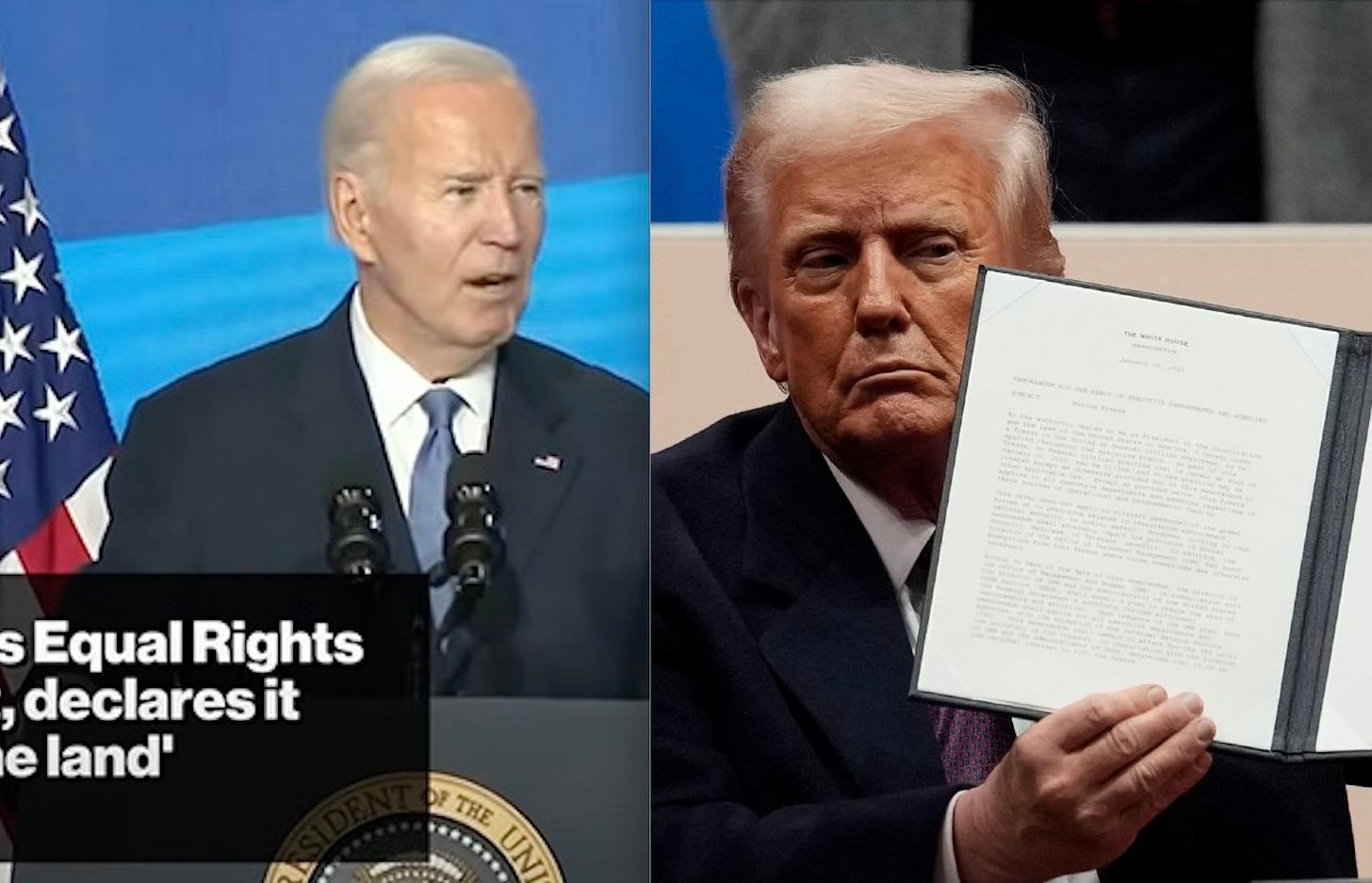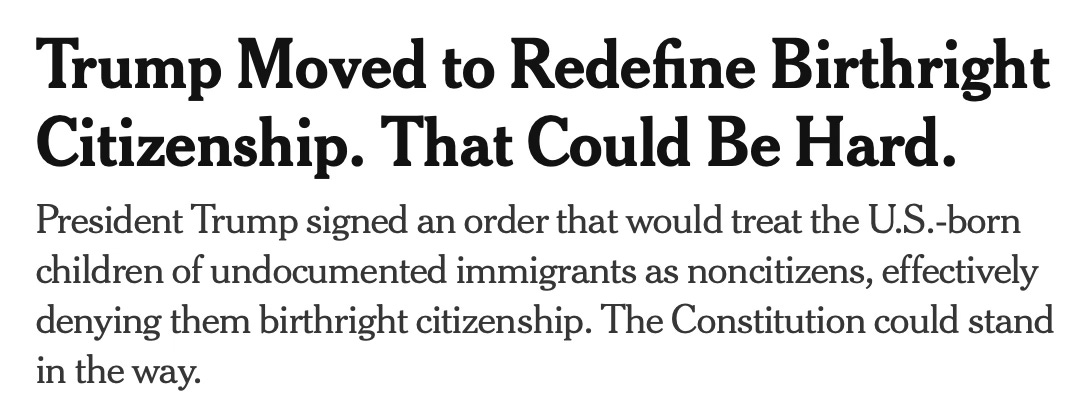A tale of two constitutional readings
Why are the media granting legitimacy to Trump's clearly counter-constitutional action?
In the past week, two different presidents have attempted to read something into the Constitution that wasn’t there. These two cases strike me as substantively pretty similar. Yet one was pretty much laughed out of the room, while the other is being taken seriously.
Last week, outgoing President Joe Biden asserted that the Equal Rights Amendment had been approved by enough state legislatures and was therefore now the 28th Amendment to the Constitution. This was based on Virginia’s approval of the amendment back in 2020, even though the congressionally-imposed deadline for ratification expired in 1982. Biden’s move was generally not taken seriously. As Annie Karni reported in the New York Times,
It was not immediately clear what the impact of his declaration would be. Under the Constitution, the president has no direct role in approving amendments, and his statement had no legal force by itself.
The archivist of the United States, a Biden appointee, has said she would not publish the amendment, on the grounds that it had not met the requirements to become part of the Constitution. And Mr. Biden declined to order her to finalize the process with the amendment’s publication.
That strikes me as a pretty fair summary of what happened. And the maneuver was generally disparaged even by Biden’s own allies. Ms. magazine ran an op/ed saying that Biden’s actions had no legal effect. Politico said that Biden’s actions “likely will not matter.” At the Washington Post, Aaron Blake explained that Biden simply can’t do that, adding, “It is at best a Hail Mary and at worst a strange political ploy that runs afoul of the rule of law Biden has spent four years pitching as one of his foremost concerns.”
Fair enough. The President can’t just dictate the contents of the Constitution.
Yet that’s what Donald Trump tried to do this week with an executive order.
The 14th amendment begins with this unambiguous sentence: “All persons born or naturalized in the United States, and subject to the jurisdiction thereof, are citizens of the United States and of the State wherein they reside.” Trump’s executive order, signed a few hours after he assumed the presidency, claims this doesn’t mean what it means. It proposes a new meaning of citizenship that excludes people born “when that person’s mother was unlawfully present in the United States and the father was not a United States citizen or lawful permanent resident at the time of said person’s birth,” among other circumstances.
Trump, as he made clear throughout his campaign, seeks nothing less than the end of birthright citizenship in the United States, which is guaranteed in the Constitution. As anyone who’s taken an Intro to American Politics class could tell you, an executive order cannot change the Constitution. Presumably, Trump’s move would get the same treatment as Biden’s gambit.
Well, here’s how the New York Times described it:
Yes, it could be hard to do something flatly unconstitutional. Yes the Constitution could stand in the way. They might have said that this is illegal or meaningless, which would be accurate. They did not.
The Washington Post said, “Trump signs executive order attempting to end birthright citizenship.” They don’t say that he can’t do that, although they point out that some legal scholars say he can’t do that.
In an otherwise useful NYT Daily podcast discussion about Trump’s immigration crackdown, Michael Barbaro spoke with reporter Hamed Aleaziz about what the executive order would do:
Aleaziz: The way it works right now is when you are born in the United States, you automatically get US citizenship.
Barbaro: Birthright citizenship.
Aleaziz: Exactly. This is the way we’ve long understood US citizenship in the United States. We look to the 14th Amendment, which ensures this right. But President Trump is completely changing that. He’s making it so if your mother was here in the country unlawfully or was here with a temporary visa, and your father did not have US citizenship or a green card, no longer can you be considered a US citizen.
Barbaro: Right. A pretty bold thing to do, given that it’s in the Constitution.
“Trump is completely changing that.” “A pretty bold thing to do.” This is absurd. This is granting Trump the benefit of some doubt, or making it seem like there’s a legitimate legal debate here. There is not.
As Tim Miller said on the Bulwark podcast the other day, this is the equivalent of Joe Biden issuing an executive order saying the Second Amendment no longer exists. No one would grant that claim any legitimacy, and they would furthermore claim that he’d lost his mind.
Is it possible that this executive order will end up in the Supreme Court, and that the Court will come up with some completely radical ruling in Trump’s favor? Yes, there is some chance of that. But if that does happen, it should be treated as radical and against the plain text of the Constitution, and not just one side of a legitimate intellectual debate.
Trump is attempting some very significant policy shifts from the Resolute desk. Some of those will be legal, some will not. He has a lot of allies in Washington. The media do not need to be among them.







I was glad to see your comment on this, professor. I think your analogy with the 2nd amendment captures the situation perfectly and should cause the major media sites to blush with embarrassment. Timothy Snyder's point on "Do not obey in advance" is obviously lost on many.
Superb. And utterly depressing that legacy media has caved.